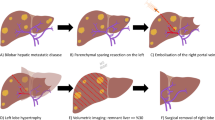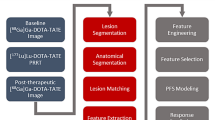Abstract
Purpose
To investigate the association between metabolic parameters of dual time point 18F-FDG PET/CT imaging and Kirsten rat sarcoma (KRAS) mutation status in colorectal liver metastases (CRLM).
Methods
Forty-nine colorectal cancer patients with 87 liver metastatic lesions were included in this retrospective study. KRAS gene mutation tests were also performed for all the patients. The maximum standardized uptake value (SUVmax) was measured for each hepatic metastatic lesion on both early and delayed scans, and the change of SUVmax (ΔSUVmax) and retention index (RI) were calculated. Uni-variate and multi-variate analyses were employed to determine the relationship between any PET/CT parameters and KRAS mutation status.
Results
Thirty-seven (42.5%) liver metastatic lesions harboring KRAS mutations were identified. The SUVmax of CRLM with KRAS mutation both on early and delayed scans was significantly higher than those with wild-type KRAS (10.7 ± 6.0 vs. 7.8 ± 3.3, P = 0.002; 15.5 ± 10.1 vs. 10.0 ± 4.2, P < 0.001, respectively). Compared with wild-type KRAS CRLM, ΔSUVmax and RI (%) of CRLM with KRAS mutation were also significantly higher than those with wild-type KRAS (4.8 ± 4.7 vs. 2.2 ± 2.0, P < 0.001; 45.3 ± 28.2 vs. 29.6 ± 24.7, P = 0.003, respectively). Multi-variate analyses showed that the SUVmax on both early and delayed scans, ΔSUVmax, and RI (%) were the 4 independent factors to predict CRLM patients harboring KRAS mutations.
Conclusion
The SUVmax on both early and delayed scans, ΔSUVmax, and RI (%) may be the 4 independent factors to predict CRLM patients harboring KRAS mutations.




Similar content being viewed by others
References
Torre LA, Bray F, Siegel RL, et al. (2015) Global cancer statistics. CA Cancer J Clin 65(2):87–108
Helling TS, Martin M (2014) Cause of death from liver metastases in colorectal cancer. Ann Surg Oncol 21(2):501–506
Nordlinger B, Sorbye H, Glimelius B, et al. (2013) Perioperative FOLFOX4 chemotherapy and surgery versus surgery alone for resectable liver metastases from colorectal cancer (EORTC 40983): long-term results of a randomised, controlled, phase 3 trial. Lancet Oncol 14(12):1208–1215
Nanji S, Cleary S, Ryan P, et al. (2013) Up-front hepatic resection for metastatic colorectal cancer results in favorable long-term survival. Ann Surg Oncol 20(1):295–304
House MG, Ito H, Gonen M et al. (2010) Survival after hepatic resection for metastatic colorectal cancer: trends in outcomes for 1600 patients during two decades at a single institution. J Am Coll Surg 210 (5):744–752, 752–745.
Kopetz S, Chang GJ, Overman MJ, et al. (2009) Improved survival in metastatic colorectal cancer is associated with adoption of hepatic resection and improved chemotherapy. J Clin Oncol 27(22):3677–3683
Douillard JY, Oliner KS, Siena S, et al. (2013) Panitumumab-FOLFOX4 treatment and RAS mutations in colorectal cancer. N Engl J Med 369(11):1023–1034
Karapetis CS, Khambata-Ford S, Jonker DJ, et al. (2008) K-ras mutations and benefit from cetuximab in advanced colorectal cancer. N Engl J Med 359(17):1757–1765
Lal N, Beggs AD, Willcox BE, et al. (2015) An immunogenomic stratification of colorectal cancer: implications for development of targeted immunotherapy. Oncoimmunology 4(3):e976052
Kwak MS, Cha JM, Yoon JY, et al. (2017) Prognostic value of KRAS codon 13 gene mutation for overall survival in colorectal cancer: direct and indirect comparison meta-analysis. Medicine (Baltimore) 96(35):e7882
Neumann J, Zeindl-Eberhart E, Kirchner T, et al. (2009) Frequency and type of KRAS mutations in routine diagnostic analysis of metastatic colorectal cancer. Pathol Res Pract 205(12):858–862
Voutsina A, Tzardi M, Kalikaki A, et al. (2013) Combined analysis of KRAS and PIK3CA mutations, MET and PTEN expression in primary tumors and corresponding metastases in colorectal cancer. Mod Pathol 26(2):302–313
Kim MJ, Lee HS, Kim JH, et al. (2012) Different metastatic pattern according to the KRAS mutational status and site-specific discordance of KRAS status in patients with colorectal cancer. BMC Cancer 12:347
Knijn N, Mekenkamp LJ, Klomp M, et al. (2011) KRAS mutation analysis: a comparison between primary tumours and matched liver metastases in 305 colorectal cancer patients. Br J Cancer 104(6):1020–1026
Krol LC, Hart NA, Methorst N, et al. (2012) Concordance in KRAS and BRAF mutations in endoscopic biopsy samples and resection specimens of colorectal adenocarcinoma. Eur J Cancer 48(7):1108–1115
Burrell RA, McGranahan N, Bartek J, et al. (2013) The causes and consequences of genetic heterogeneity in cancer evolution. Nature 501(7467):338–345
Gutenberg A, Gerdes JS, Jung K, et al. (2010) High chromosomal instability in brain metastases of colorectal carcinoma. Cancer Genet Cytogenet 198(1):47–51
Lee JW, Kim SK, Lee SM, et al. (2011) Detection of hepatic metastases using dual-time-point FDG PET/CT scans in patients with colorectal cancer. Mol Imaging Biol 13(3):565–572
Dirisamer A, Halpern BS, Schima W, et al. (2008) Dual-time-point FDG-PET/CT for the detection of hepatic metastases. Mol Imaging Biol 10(6):335–340
Yun J, Rago C, Cheong I, et al. (2009) Glucose deprivation contributes to the development of KRAS pathway mutations in tumor cells. Science 325(5947):1555–1559
Kawada K, Nakamoto Y, Kawada M, et al. (2012) Relationship between 18F-fluorodeoxyglucose accumulation and KRAS/BRAF mutations in colorectal cancer. Clin Cancer Res 18(6):1696–1703
Caicedo C, Garcia-Velloso MJ, Lozano MD, et al. (2014) Role of [(1)(8)F]FDG PET in prediction of KRAS and EGFR mutation status in patients with advanced non-small-cell lung cancer. Eur J Nucl Med Mol Imaging 41(11):2058–2065
Allegra CJ, Jessup JM, Somerfield MR, et al. (2009) American Society of Clinical Oncology provisional clinical opinion: testing for KRAS gene mutations in patients with metastatic colorectal carcinoma to predict response to anti-epidermal growth factor receptor monoclonal antibody therapy. J Clin Oncol 27(12):2091–2096
Chen SW, Chiang HC, Chen WT, et al. (2014) Correlation between PET/CT parameters and KRAS expression in colorectal cancer. Clin Nucl Med 39(8):685–689
Lovinfosse P, Koopmansch B, Lambert F, et al. (2016) (18)F-FDG PET/CT imaging in rectal cancer: relationship with the RAS mutational status. Br J Radiol 89(1063):20160212
Lee JH, Kang J, Baik SH, et al. (2016) Relationship between 18F-fluorodeoxyglucose uptake and V-Ki-Ras2 Kirsten Rat sarcoma viral oncogene homolog mutation in colorectal cancer patients: variability depending on C-reactive protein level. Medicine (Baltimore) 95(1):e2236
Cho A, Jo K, Hwang SH, et al. (2017) Correlation between KRAS mutation and (18)F-FDG uptake in stage IV colorectal cancer. Abdom Radiol (NY) 42(6):1621–1626
Kawada K, Toda K, Nakamoto Y, et al. (2015) Relationship between 18F-FDG PET/CT scans and KRAS mutations in metastatic colorectal cancer. J Nucl Med 56(9):1322–1327
Krikelis D, Skoura E, Kotoula V, et al. (2014) Lack of association between KRAS mutations and F-18-FDG PET/CT in caucasian metastatic colorectal cancer patients. Anticancer Res 34(5):2571–2579
Abgral R, Valette G, Robin P, et al. (2016) Prognostic evaluation of percentage variation of metabolic tumor burden calculated by dual-phase (18) FDG PET-CT imaging in patients with head and neck cancer. Head Neck 38(Suppl 1):E600–606
Xi Y, Guo R, Hu J, et al. (2014) 18F-fluoro-2-deoxy-d-glucose retention index as a prognostic parameter in patients with pancreatic cancer. Nucl Med Commun 35(11):1112–1118
Garcia Vicente AM, Castrejon AS, Relea Calatayud F, et al. (2012) 18F-FDG retention index and biologic prognostic parameters in breast cancer. Clin Nucl Med 37(5):460–466
Shimizu K, Okita R, Saisho S, et al. (2015) Clinical significance of dual-time-point 18F-FDG PET imaging in resectable non-small cell lung cancer. Ann Nucl Med 29(10):854–860
Houseni M, Chamroonrat W, Zhuang J, et al. (2010) Prognostic implication of dual-phase PET in adenocarcinoma of the lung. J Nucl Med 51(4):535–542
Lee JH, Lee WA, Park SG, et al. (2012) Relationship between dual-time point FDG PET and immunohistochemical parameters in preoperative colorectal cancer: preliminary study. Nucl Med Mol Imaging 46(1):48–56
Acknowledgements
We thank Dr. Yingjie Zheng for his assistance in statistical analysis.
Author information
Authors and Affiliations
Corresponding author
Ethics declarations
Funding
No internal or external grant funds supported this work.
Conflict of interest
The authors declare that there is no conflict of interests.
Ethical approval
All procedures performed in studies involving human participants were in accordance with the ethical standards of the institutional and/or national research committee and with the 1964 Helsinki declaration and its later amendments or comparable ethical standards.
Informed consent
The institutional review board approved this retrospective study. Informed consent was waived.
Rights and permissions
About this article
Cite this article
Mao, W., Zhou, J., Zhang, H. et al. Relationship between KRAS mutations and dual time point 18F-FDG PET/CT imaging in colorectal liver metastases. Abdom Radiol 44, 2059–2066 (2019). https://doi.org/10.1007/s00261-018-1740-8
Published:
Issue Date:
DOI: https://doi.org/10.1007/s00261-018-1740-8




